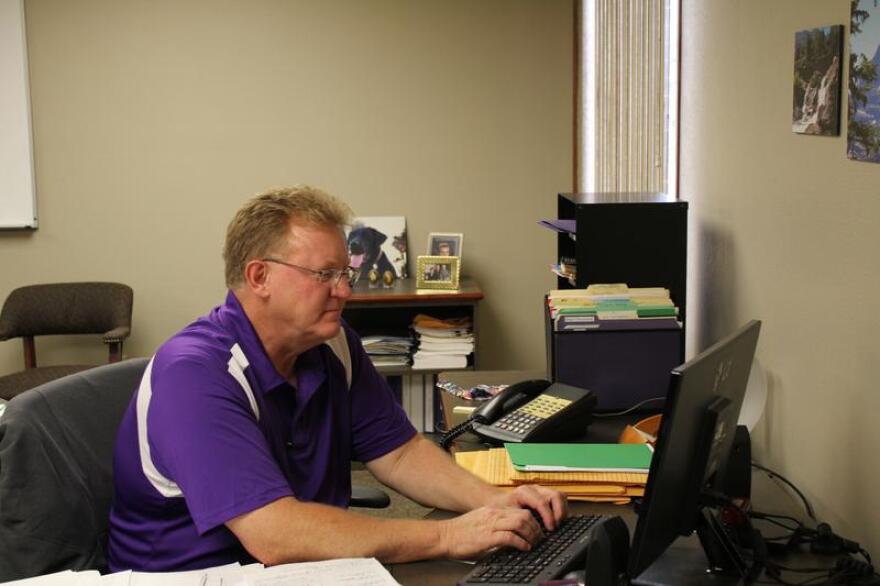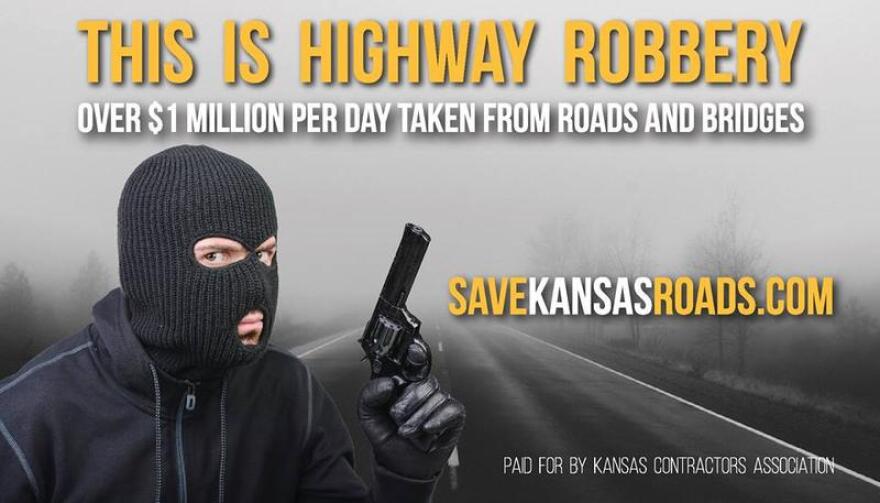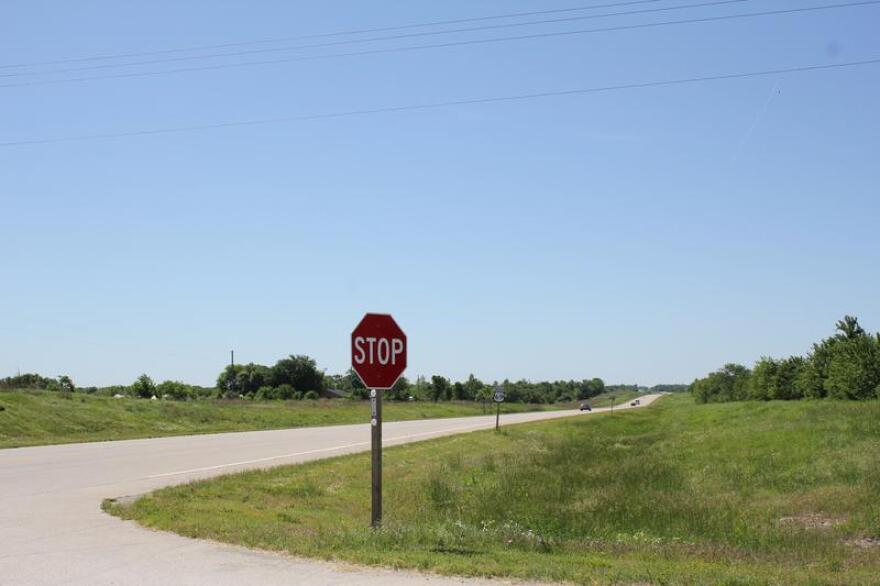As the 2016 legislative session was winding down in May, Sen. Jake LaTurner sat for an interview on a bench just outside the Old Supreme Courtroom.
The first-term Republican from Pittsburg was still about a half-year away from facing his first reelection challenge. But he could already anticipate one issue that would be big for his campaign.
"Highway 69 is always an issue in the elections," LaTurner said. "If you're a Republican, a Democrat, an independent, whatever your party affiliation is, you better be a supporter of Highway 69."
U.S. Highway 69 connects southeast Kansas to Kansas City.
Earlier this year, the Kansas Department of Transportation was scheduled to expand the 20-mile stretch between Pittsburg and Fort Scott to four lanes with a median — something locals have desired for years.
Then, in April, that project was among 25 delayed by the department due to highway fund sweeps Gov. Sam Brownback and Republican legislators have required to balanced the budget the last several years.
THE LIST: Kansas legislative districts where highway projects are delayed and who's running for election there
A portion of the Highway 69 expansion has since been reinstated after LaTurner protested.
But two-thirds of it remains in limbo, along with dozens of other road projects across the state. That could make reelection bids rockier, especially for Republicans associated with Brownback and his budgets.
The state has had to cut many areas since the governor spearheaded large income tax reductions in 2012.

Pittsburg State University was among them, but the school's president, Steven Scott, said the public outcry went to a higher level when Highway 69 landed on the chopping block.
"When it was the road being cut that was a totally different thing," Scott said. "It's like it just touched everybody in the community because virtually everybody at some point is going to head up in that direction."
Those who use the road are concerned about safety, Scott said. A 17-year-old high school student who planned to attend Pittsburg State died in a head-on collision north of town earlier this year.
Brownback's campaign promise
This isn't the first time Highway 69 has factored into an election.
Brownback went to southeast Kansas just a month before the general election in 2014 to reassure voters the expansion to four lanes was going to happen. He was seeking reelection against Paul Davis, a Democrat who had warned that Brownback was more committed to income tax cuts than highway projects and other budget priorities.
Brownback won the race, but has had to sweep increasing amounts from the highway fund every year since to keep the state general fund balanced.
KDOT was still able to keep up with its scheduled projects for a while. Interest rates were very low and gas prices also fell.
But as the funds passed $1 billion, something had to give, and Highway 69 was among the projects that did — at least for a while.
After the delays were announced in April, LaTurner sent an open letter to Brownback decrying the inclusion of Highway 69 and asking that it be reinstated.
Senate Minority Leader Anthony Hensley, a Democrat from Topeka, predicted that Brownback would try to help LaTurner, who has been generally supportive of the governor's tax policies. Weeks later, the governor announced that KDOT had freed up $25 million to put the Highway 69 expansion back on the schedule and the contract would go up for bids in October, a month before the election.
Still, that's only about one-third of the money the state will need to complete the project. And more than 20 others are still on hold, including one in Hensley's district.
"If the governor chooses to approve the continuatoin of the project on Highway 69, then he should do the same thing for Highway 31," Hensley said. "Unless, in fact, he's just going to cherry-pick and choose to engage in political favoritism here, where he would, you know, help Jake LaTurner, who's a Republican and wouldn't help me, being a Democrat."
Hensley said the Democrats would still use the highway delays as campaign fodder.
To do so in southeast Kansas, they'll have to prove they've restored trust there. A party official was caught bad-mouthing the region in an online chatroom just before the last election, in what Hensley called "a very unfortunate incident."

Wilma Herman, who has lived in Pittsburg for more than 50 years, said the residents of the state's most economically-depressed region feel little love from anyone in Topeka.
"It just seems like this corner of the state is kind of forgotten," Herman said. "Like we don't exist. We do a lot of things for other people. That just kind of hurts."
A highway rescue?
The governor's spokeswoman told the Topeka Capital-Journal that he was following through on the assurances he made in 2014 by freeing the $25 million to start the Highway 69 expansion.
But some in southeast Kansas remain skeptical that money will materialize.
Melody Brennon, who works at an area school, noted that during a recent special session, prominent legislators suggested using that money to satisfy a school finance court ruling. The Legislature ultimately tapped other sources.
But given the state's precarious fiscal position, and the on-again/off-again history of the Highway 69 expansion, Brennon said she won't believe it's really happening until shovels hit the dirt.
"There's money, then there's not, then all of a sudden there's money [again]," Brennon said. "If you can find $25 million, how about funding our schools too?"

Destry Brown, the superintendent of schools in Pittsburg, also said voters need to broaden their focus beyond Highway 69 to the overall budgetary policies that pulled the money for that project and the others.
"The reason they were cut is because the state's broke," Destry said. "Why is the state broke? Because the tax plan that they've got in place can't support the state. They can't pay their bills."
It remains to be seen how much the road construction delays will factor into the legislative elections for Kansas House and Senate. But Democrats aren't the only ones who plan to make them an issue.
The Kansas Contractors Association, a group that represents roadwork companies, had warned for years that the highway fund could only take so many sweeps before projects were put off. Bob Totten, the association's executive vice president said the group plans to be active in the upcoming elections, letting voters know whether their representatives voted for tax and spending policies that necessitated the highway fund sweeps.
They've already placed prominent billboards across the state calling the sweeps "highway robbery."

Totten said that unless the state changes its tax policy, the delayed projects will remain delayed.
"They're not going to come back because we don't have a revenue stream that's going to make any difference," Totten said. "And our Legislature chose not to do anything about it and go home and start to seek reelection."
Andy Marso is a reporter for KHI News Service in Topeka, a partner in the Heartland Health Monitor team. You can reach him on Twitter @andymarso.





